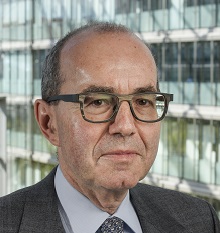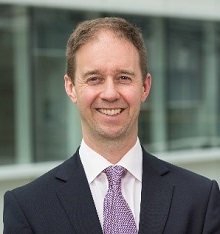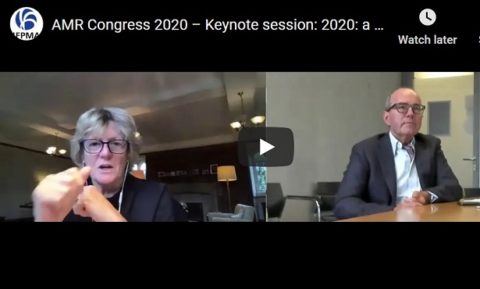Original article published on Taggesspigel on 15 June 2021.
Mr Cueni, of all things, the COVID-19 pandemic, triggered by a virus, could further fuel the development of resistance in bacteria: many Covid 19 patients in hospitals are given antibiotics unnecessarily. G-7 health ministers are warning of a “creeping pandemic” and have been pushing for the development of new drugs for years. At the same time, pharmaceutical companies are saying goodbye to antibiotic research in frustration. How does this fit together?
Mr Cueni: In their analysis, politicians, scientists and industry agree: there is an urgent need for action. If COVID is a tsunami, then antibiotic resistance is a slowly melting glacier. According to the World Health Organisation, antibiotic resistance already kills 700,000 people worldwide every year. If we do nothing, by 2050 there will be ten million – per year. These are avoidable deaths. The keywords for solving the problem are well known: One Health approach, appropriate use, also in agriculture, surveillance, fair access for developing countries. And above all, innovative antibiotics; many of the current ones are no longer effective. Everyone is aware that the problem must be tackled at its root, and that root is: no new antibiotics are coming onto the market because there is simply no market for new antibiotics at the moment and antibiotic research is making start-up companies insolvent.
You are the Director General of the IFPMA, you represent the interests of these companies. Do you feel abandoned by politics?
Mr Cueni: Mutual recriminations are pointless. The German Chancellor was one of the first politicians worldwide to take antibiotic resistance seriously. That deserves recognition. But there is a difference between signing a summit declaration at G7 or G20 and signing a billion-dollar cheque to make antibiotics research profitable again.
The German pharmaceutical market alone achieved a turnover of almost 50 billion euros last year. Let’s be honest: What’s the matter?
Mr Cueni: The market situation for antibiotics is disastrous. In 2019 and 2020 alone, four companies had to file for bankruptcy. They could not continue to exist, even though they had brought new, successful antibiotics to the market and had received their approval, in some cases with priority, from the US Food and Drug Administration (FDA). Achaogen, for example, a start-up company from California, had not even achieved one million dollars in sales with its new antibiotic after 18 months.
How could it come to this?
Mr Cueni: For decades, antibiotics were neither used properly nor carefully in human and veterinary medicine. This has led to resistance. As a consequence, innovative antibiotics are being used today mainly as reserve therapies; they end up in cupboards of hospital pharmacies and are only used in emergencies when nothing else helps. However, these innovations are paid like antibiotics that were developed 30 or 40 years ago and have achieved large volumes over the decades, based on improper use. Thus, a new antibiotic makes very low sales but costs a lot of money in development and research, about 1.5 billion euros.
What makes research so expensive?
Mr Cueni: Developing new active principles is a scientific challenge; the low-hanging fruit has already been harvested. In addition, the regulatory requirements are high. For the clinical trials, you need quite a large number of patients, because the drug has to be tested widely. Company directors tell me that they have to invest in specially equipped factories for the production line in the early phase I of clinical trials. Afterwards, however, these factories stand empty and the manufacturers cannot sell their product because it is only needed as a reserve antibiotic. Companies that research antibiotics today and succeed are worse off than those that fail: because they lose money every day, while the others can at least write off their research costs. All of this is not productive.
What would be productive from your point of view?
Thomas Cueni: You have to decouple incentives from sales. We need to treat antibiotics like a fire extinguisher: everyone has it in the house, but no one hopes to ever need it. Nevertheless, everyone pays their fire insurance.
Are you calling for a premium for antibiotics?
Thomas Cueni: For example. Everyone who goes to hospital, for example because they want to have their knee screened, could pay a supplement of, say, five euros, which would then be used as a premium for antibiotics research. A Netflix model for reserve antibiotics would also be conceivable: One no longer pays per therapeutic dispensed, but rather an annual subscription, so to speak, for the reserve antibiotics, which are only used when needed, i.e. one decouples the price from the amount of antibiotics used. We have seen in research on drugs for rare diseases how strongly incentives can work by granting prices for these drugs that correspond to the rarity of the disease. One could also consider using patent protection as an incentive for research. Even an extension of patent protection from the current 20 to 70 years, however, would not bring much to new antibiotics as long as few are sold. It would be conceivable, however, that for every truly innovative antibiotic, the patent protection of another drug would be extended by six or twelve months. There are so many possibilities.
Admittedly, this means that not a single new antibiotic has been developed yet. And time is pressing.
Mr Cueni: Right. We need more venture capital, and above all we need it quickly. And that is why the industry is not whining but is facing up to its social responsibility and launched the AMR Action Fund a year ago. Twenty-three pharmaceutical companies have committed to providing a total of one billion US dollars as financing bridge for projects of start-up companies that want to make the jump from phase I to phase II and III. The fund management is independent in its decision-making about who gets funded. If the model works, it may be that one or the other start-up will one day find a place with the big players. In this way, we hope to bring two to four new antibiotics to market in the next seven to ten years. That is our contribution. However, this will only be successful and lead to more investment in antibiotics research if politicians have taken the right steps by then, so that antibiotics research can be financed sustainably in the future.
Vaccines against covid-19 could also be developed at a rapid pace because researchers cooperated internationally and building blocks for the innovative mRNA technology had been prepared years before. A model for antibiotics research?
Mr Cueni: The community in this area is clear, and of course it also exchanges information. But what has to be stated objectively is this: The difficult environment in commercial antibiotics research has led to many young people, even though they are fascinated by microbiology, not taking up their studies or changing careers. We are lacking the offspring.
Why?
Mr Cueni: When students see that there is little or nothing going on in their field at the larger research-based pharmaceutical companies, then they know that there will also be no demand for microbiologists. So we also need incentives for studies, we need an environment where, in addition to start-ups, large pharmaceutical companies are still doing research or are doing it again.
MSD, Pfizer and GSK are setting a good example here, because they never dropped out of antibiotics research. It is also gratifying that the company Roche re-entered the early phase of antibiotics research a few years ago and is now also participating in the AMR Fund.
Gradually, politicians and pharmaceutical companies are realising that the most modern cancer research is of little use if the patient develops a secondary infection in the meantime and the antibiotic is no longer effective. That is why, despite the dry analysis of the current situation, I am actually optimistic that something is now moving. Thanks to the leadership of countries like the Federal Republic of Germany and the United Kingdom, there seems to be a growing awareness at the G7 that the COVID 19 pandemic has caught the world on the wrong foot, so it is important to create the right incentives now when it comes to antibiotic resistance. The PASTEUR Act, which is being reintroduced in the US Congress this week, could be a ground-breaking global model in this regard because it contains both monetary incentives for successful investment in research and careful use of new antibiotics.











